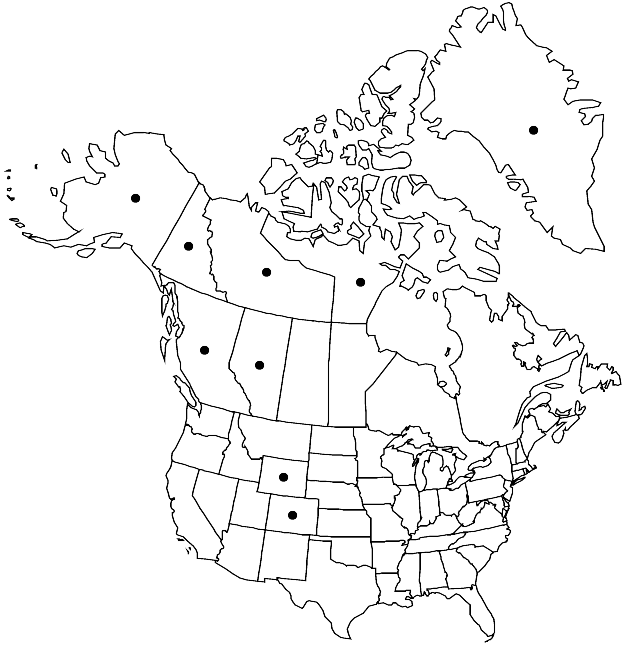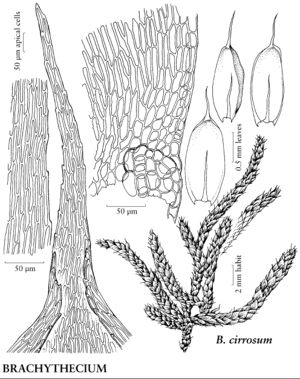Brachythecium cirrosum
Syn. Musc. Eur., 696. 1860.
Plants large, occasionally small, in moderately dense mats, light green, becoming whitish stramineous or golden yellow in exposed habitats. Stems to 10 cm, creeping to ascending, julaceous, irregularly or rarely regularly pinnate, branches to 16 mm, straight to flexuose, julaceous. Stem leaves loosely appressed on proximal portions of stem, closely imbricate, ovate, broadest at 1/4–1/3(–2/5) leaf length, concave, not or slightly plicate, 2–3 × 0.6–1.2 mm; base gradually rounded, indistinctly short-decurrent; margins plane, incurved or recurved basally, entire or minutely serrulate below acumen, serrate or entire in acumen on leaves of same shoot; apex abruptly contracted, acumen filiform, long; costa to 30–60% leaf length, broad proximally, rapidly narrowing distally, sometimes shorter or 2-fid from base, terminal spine absent; alar cells subquadrate, same size as or smaller than basal cells, 13–20 µm wide, walls thick, region distinctly or indistinctly delimited, of 6–8 × 5–6 cells, opaque or moderately pellucid; laminal cells linear, 30–80(–100) × 6–7 µm; basal cells to 10–12 µm wide, walls weakly to moderately thick, region in 2 or 3 rows. Branch leaves similar, smaller. Sexual condition dioicous. Seta red-brown, 1.5 cm, rough. Capsule horizontal, red-brown, elongate, curved, 16 mm; annulus separating by fragments; operculum sharply long-conic. Spores 18–20 µm.
Habitat: Wet cliffs, rock outcrops, soil in arctic and mountain tundra, among other mosses
Elevation: low to high elevations (0-4200 m)
Distribution

Greenland, Alta., B.C., N.W.T., Nunavut, Yukon, Alaska, Colo., Wyo., Europe, Asia.
Discussion
Brachythecium cirrosum has a mainly arctic-alpine distribution, with the exception of East Asia, where it grows on trunks of evergreen trees. The species is usually unmistakable due to its strongly cirrose appearance: leaves are invariably contracted into widely spreading filiform acumina, clearly expressed in both stem and branch leaves. The alar regions reach from the margin 25–50% the distance to the costa. Distinction from 14. B. brandegeei and Cirriphyllum piliferum is discussed under these other species.
Selected References
None.
